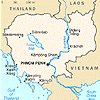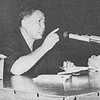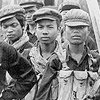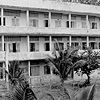
An attempt by Khmer Rouge leader Pol Pot to form a Communist peasant farming society resulted in the deaths of 25 percent of the country's population from starvation, overwork and executions.
Pol Pot was born in 1925 (as Saloth Sar) into a farming family in central Cambodia, which was then part of French Indochina. In 1949, at age 20, he traveled to Paris on a scholarship to study radio electronics but became absorbed in Marxism and neglected his studies. He lost his scholarship and returned to Cambodia in 1953 and joined the underground Communist movement. The following year, Cambodia achieved full independence from France and was then ruled by a royal monarchy.
Map & Photos |

Cambodia and surrounding area. |

Pol Pot addresses a closed meeting in Phnom Penh after the 1975 Khmer Rouge victory. |

Young Khmer Rouge soldiers in 1975. |

Tuol Sleng Prison, the nerve center of the Khmer Rouge secret police. Today it's the Tuol Sleng Museum of Genocide. |

The Killing Fields at Choeung Ek. This mass grave, discovered in 1980, was one of the first proofs to the outside world of what had occurred during Pol Pot's regime. |
By 1962, Pol Pot had become leader of the Cambodian Communist Party and was forced to flee into the jungle to escape the wrath of Prince Norodom Sihanouk, leader of Cambodia. In the jungle, Pol Pot formed an armed resistance movement that became known as the Khmer Rouge (Red Cambodians) and waged a guerrilla war against Sihanouk's government.
In 1970, Prince Sihanouk was ousted, not by Pol Pot, but due to a U.S.-backed right-wing military coup. An embittered Sihanouk retaliated by joining with Pol Pot, his former enemy, in opposing Cambodia's new military government. That same year, the U.S. invaded Cambodia to expel the North Vietnamese from their border encampments, but instead drove them deeper into Cambodia where they allied themselves with the Khmer Rouge.
From 1969 until 1973, the U.S. intermittently bombed North Vietnamese sanctuaries in eastern Cambodia, killing up to 150,000 Cambodian peasants. As a result, peasants fled the countryside by the hundreds of thousands and settled in Cambodia's capital city, Phnom Penh.
All of these events resulted in economic and military destabilization in Cambodia and a surge of popular support for Pol Pot.
By 1975, the U.S. had withdrawn its troops from Vietnam. Cambodia's government, plagued by corruption and incompetence, also lost its American military support. Taking advantage of the opportunity, Pol Pot's Khmer Rouge army, consisting of teenage peasant guerrillas, marched into Phnom Penh and on April 17 effectively seized control of Cambodia.
Once in power, Pol Pot began a radical experiment to create an agrarian utopia inspired in part by Mao Zedong's Cultural Revolution which he had witnessed first-hand during a visit to Communist China.
Mao's "Great Leap Forward" economic program included forced evacuations of Chinese cities and the purging of "class enemies." Pol Pot would now attempt his own "Super Great Leap Forward" in Cambodia, which he renamed the Democratic Republic of Kampuchea.
He began by declaring, "This is Year Zero," and that society was about to be "purified." Capitalism, Western culture, city life, religion, and all foreign influences were to be extinguished in favor of an extreme form of peasant Communism.
All foreigners were thus expelled, embassies closed, and any foreign economic or medical assistance was refused. The use of foreign languages was banned. Newspapers and television stations were shut down, radios and bicycles confiscated, and mail and telephone usage curtailed. Money was forbidden. All businesses were shuttered, religion banned, education halted, health care eliminated, and parental authority revoked. Thus Cambodia was sealed off from the outside world.
All of Cambodia's cities were then forcibly evacuated. At Phnom Penh, two million inhabitants were evacuated on foot into the countryside at gunpoint. As many as 20,000 died along the way.
Millions of Cambodians accustomed to city life were now forced into slave labor in Pol Pot's "killing fields" where they soon began dying from overwork, malnutrition and disease, on a diet of one tin of rice (180 grams) per person every two days.
Workdays in the fields began around 4 a.m. and lasted until 10 p.m., with only two rest periods allowed during the 18 hour day, all under the armed supervision of young Khmer Rouge soldiers eager to kill anyone for the slightest infraction. Starving people were forbidden to eat the fruits and rice they were harvesting. After the rice crop was harvested, Khmer Rouge trucks would arrive and confiscate the entire crop.
Ten to fifteen families lived together with a chairman at the head of each group. All work decisions were made by the armed supervisors with no participation from the workers who were told, "Whether you live or die is not of great significance." Every tenth day was a day of rest. There were also three days off during the Khmer New Year festival.
Throughout Cambodia, deadly purges were conducted to eliminate remnants of the "old society" - the educated, the wealthy, Buddhist monks, police, doctors, lawyers, teachers, and former government officials. Ex-soldiers were killed along with their wives and children. Anyone suspected of disloyalty to Pol Pot, including eventually many Khmer Rouge leaders, was shot or bludgeoned with an ax. "What is rotten must be removed," a Khmer Rouge slogan proclaimed.
In the villages, unsupervised gatherings of more than two persons were forbidden. Young people were taken from their parents and placed in communals. They were later married in collective ceremonies involving hundreds of often-unwilling couples.
Up to 20,000 persons were tortured into giving false confessions at Tuol Sleng, a school in Phnom Penh which had been converted into a jail. Elsewhere, suspects were often shot on the spot before any questioning.
Ethnic groups were attacked including the three largest minorities; the Vietnamese, Chinese, and Cham Muslims, along with twenty other smaller groups. Fifty percent of the estimated 425,000 Chinese living in Cambodia in 1975 perished. Khmer Rouge also forced Muslims to eat pork and shot those who refused.
On December 25, 1978, Vietnam launched a full-scale invasion of Cambodia seeking to end Khmer Rouge border attacks. On January 7, 1979, Phnom Penh fell and Pol Pot was deposed. The Vietnamese then installed a puppet government consisting of Khmer Rouge defectors.
Pol Pot retreated into Thailand with the remnants of his Khmer Rouge army and began a guerrilla war against a succession of Cambodian governments lasting over the next 17 years. After a series of internal power struggles in the 1990s, he finally lost control of the Khmer Rouge. In April 1998, 73-year-old Pol Pot died of an apparent heart attack following his arrest, before he could be brought to trial by an international tribunal for the events of 1975-79.
